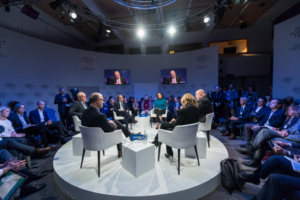 Whether women are elected to local, state, or national office or are appointed to visible senior roles in federal government, they face more threats and attacks, sometimes physical, than ever before. Adeel Hassan of the New York Times reports that 79 percent of mayors in the United States “report being the victim of harassment, threats or other psychological abuse, according to a recent study” published in the academic journal State and Local Government Review. Hassan goes on to note that in a statistical analysis of the study data, gender stood out as a predictor of whether a mayor would be a target:
Whether women are elected to local, state, or national office or are appointed to visible senior roles in federal government, they face more threats and attacks, sometimes physical, than ever before. Adeel Hassan of the New York Times reports that 79 percent of mayors in the United States “report being the victim of harassment, threats or other psychological abuse, according to a recent study” published in the academic journal State and Local Government Review. Hassan goes on to note that in a statistical analysis of the study data, gender stood out as a predictor of whether a mayor would be a target:
- Female mayors were more than twice as likely as their male counterparts to experience psychological abuse, such as online threats.
- Female mayors were almost three times as likely to experience physical violence.
Hassan notes that while many mayors now accept that verbal and physical abuse are part of public life, it doesn’t keep people from running for office, “but it burns people out once they’re in it.”
In the United Kingdom, women running for office report a significant increase in death threats, abuse on social media, and threatening graffiti. A study, reported by Megan Specia of the New York Times and conducted during the most recent election, “showed that female lawmakers received disproportionately more abuse on social media, with women of color receiving an even larger share.” In 2016, Jo Cox, a Labour lawmaker, was shot and killed by a man shouting “Britain first” and “Death to traitors” as she campaigned for Britain to remain in the European Union. While women are still running for office in the United Kingdom, they are more cautious about how they campaign since the death of Jo Cox.
Julian Borger, writing for the Guardian, reported that Dr. Fiona Hill, the senior director for Europe and Russia in the National Security Council in the US government, said she has been subjected to a campaign of harassment and intimidation, which reached a new peak after she agreed to testify in congressional impeachment hearings. Since those hearings, the harassment has continued and intensified.
Misogyny, or the hatred of women, is deeply embedded in white Western cultures and is a big factor in why women are not equitably represented in senior leadership roles. Women of color are subjected to a double dose of discouragement and intimidation as they deal with both sexism and racism when they seek leadership roles. Lisa Lerer and Jennifer Medina of the New York Times note that in her candidacy for president of the United States, Kamala Harris could neither get support from the Democratic Party nor raise the funds she needed to continue her campaign because as a black women she was deemed “unelectable” in majority-white areas.
What will it take for the talents of women of all races to be valued and for the harassment and threats to stop? Let us hear from you about what you think could bring positive change.
Photo by Evangeline Shaw on Unsplash
Let’s get a woman in the White Housein 2020! Based on the NYTimes endorsement of Warren *and* Klobuchar today, maybe we can get TWO elected as Pres and Veep. That would, of course, heighten the backlash. But over time, imagine the impact.